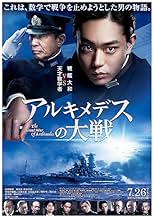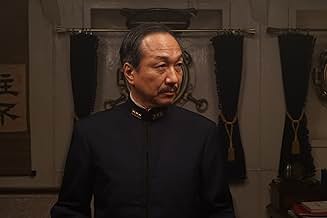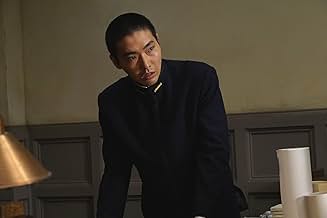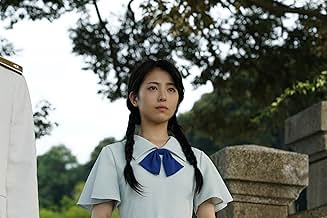IMDb RATING
6.7/10
1.3K
YOUR RATING
In 1933, a young naval officer and math prodigy uncovers a conspiracy regarding the construction of Japanese warships for the ongoing World War 2.In 1933, a young naval officer and math prodigy uncovers a conspiracy regarding the construction of Japanese warships for the ongoing World War 2.In 1933, a young naval officer and math prodigy uncovers a conspiracy regarding the construction of Japanese warships for the ongoing World War 2.
- Director
- Writers
- Stars
- Awards
- 4 nominations total
T.J. Anthony
- Osami Nagano
- (English version)
- (voice)
Luis Bermudez
- Mr. Osato
- (English version)
- (voice)
Jacob Eiseman
- Various Soldiers and Walla
- (English version)
- (voice)
Alex Hom
- Shojiro Tanaka
- (English version)
- (voice)
Chase Kloza
- Additional voices
- (English version)
- (voice)
Lizzy Laurenti
- Walla
- (voice)
Nicholas Markgraf
- Additional Voices
- (English version)
- (voice)
- …
- Director
- Writers
- All cast & crew
- Production, box office & more at IMDbPro
Featured reviews
If you are interested in watching this film, I strongly suggest you give a quick read on the general failures of Washington Naval Conference, which sets up the meaning and context of the plot of this film.
Essentially the Washington Naval conference plus London naval conference, like most arms control treaties, addressed and limited the instruments of the PRIOR war in an attempt to forestall future wars. In the case of the 1920's WNC, it effectively limited the number of battleships and other large naval gunfire platforms such as battle/heavy a nation could have. The logic was that since these were main instrumentalities in WWI, and the metric of a nations overall industrial power, that limiting them would prevent war. Hence the "Archimedes" in the title. As you will recall from physics class, the ancient Greek scientist is the one who shouted "eureka" when understanding that as he went into a tub of bathwater that his body was displacing an equal weight of water. This goes to the metric controlled by WNC /LNC-- the weight displaced by warships.
There are two things in the background in this film: a) the systematic cheating on the metrics by Japan, and b) supposed divisions within the Imperial Japanese Navy as to how to allocate its allowed tonnage of displacement. There is a problem in the latter, because this film repeats debunked revisionist claims that the resistance to build battleships like Yamato was significant. It was not. Theses supposedly prescient cadre of young officers who wanted to build more carriers than Japan had built simply did not exist. And the problem Japan had with aviation in WWII was not carriers or airbases -- it was a total inability to replace their aviators due to something that had nothing to do with military industrial capacity . To wit Japan's severely lacking higher education system which is needed from which to select potential air crews. Japan was not able to crew even its land based aircraft being produced even during the war.
Essentially the Washington Naval conference plus London naval conference, like most arms control treaties, addressed and limited the instruments of the PRIOR war in an attempt to forestall future wars. In the case of the 1920's WNC, it effectively limited the number of battleships and other large naval gunfire platforms such as battle/heavy a nation could have. The logic was that since these were main instrumentalities in WWI, and the metric of a nations overall industrial power, that limiting them would prevent war. Hence the "Archimedes" in the title. As you will recall from physics class, the ancient Greek scientist is the one who shouted "eureka" when understanding that as he went into a tub of bathwater that his body was displacing an equal weight of water. This goes to the metric controlled by WNC /LNC-- the weight displaced by warships.
There are two things in the background in this film: a) the systematic cheating on the metrics by Japan, and b) supposed divisions within the Imperial Japanese Navy as to how to allocate its allowed tonnage of displacement. There is a problem in the latter, because this film repeats debunked revisionist claims that the resistance to build battleships like Yamato was significant. It was not. Theses supposedly prescient cadre of young officers who wanted to build more carriers than Japan had built simply did not exist. And the problem Japan had with aviation in WWII was not carriers or airbases -- it was a total inability to replace their aviators due to something that had nothing to do with military industrial capacity . To wit Japan's severely lacking higher education system which is needed from which to select potential air crews. Japan was not able to crew even its land based aircraft being produced even during the war.
First it must be stated that this in no way is a 'war movie' as most think of it. The only direct depiction of battle occurs in the beginning of the movie, and as others have said requires some background knowledge of the actual history to grasp what is being depicted. However, I found it striking (and others without the historical knowledge can do likewise) to think back on this scene after the architect describes the ship's purpose later in the movie. I have no idea how accurate the movie is in depicting the actual sentiment's of the architect, but regardless it struck me and made me rethink how I viewed the construction of the ship in question.
At this point it must also be said that the dubbing of the movie does it no favors (besides not requiring a fluency in Japanese to view). The dubbed voices of all figures accept Yamamoto seemed to me to often not reflect the sentiments of the action depicted, which does detract from the viewing experience. However, they do serve to make the movie understandable for non-Japanese speakers such as myself, and for that at least I am grateful. I'm not sure if it is possible to watch the movie in Japanese but simply with English subtitles, but it is something to look into if you find the dubbing too jarring to watch the movie otherwise.
Returning to the rest of the movie, it follows the discussion of how the Imperial Japanese Navy (IJN) planned to expand during the 1930s, when war with the world was not yet actuality, but could be seen on the horizon. It therefore closely examines (with a background of the internal politics of the Japanese armed forces) the debate over two potential paths of expansion, and the costs behind each one. Cue the wiz-kid with a knack for numbers, called in to question the expected costs of one of the plans. And here is where the viewer intent on a stereotypical war movie will lose interest; but for those who continue watching, they will likely leave with a much greater appreciation for all of the abstract mathematical concepts they suffered through in school (I know I for one left seeing much better the usefulness of optimization and regression than when I began). This is a war movie that considers the intellectual backing of the effort, whether that be calculations, counterintelligence, or even how to effectively utilize (or counter if need be) the underpinnings of a nation at war; and that is not something with a terribly large audience of interest. But for those interested in such things, I found the movie a terrific watch.
At this point it must also be said that the dubbing of the movie does it no favors (besides not requiring a fluency in Japanese to view). The dubbed voices of all figures accept Yamamoto seemed to me to often not reflect the sentiments of the action depicted, which does detract from the viewing experience. However, they do serve to make the movie understandable for non-Japanese speakers such as myself, and for that at least I am grateful. I'm not sure if it is possible to watch the movie in Japanese but simply with English subtitles, but it is something to look into if you find the dubbing too jarring to watch the movie otherwise.
Returning to the rest of the movie, it follows the discussion of how the Imperial Japanese Navy (IJN) planned to expand during the 1930s, when war with the world was not yet actuality, but could be seen on the horizon. It therefore closely examines (with a background of the internal politics of the Japanese armed forces) the debate over two potential paths of expansion, and the costs behind each one. Cue the wiz-kid with a knack for numbers, called in to question the expected costs of one of the plans. And here is where the viewer intent on a stereotypical war movie will lose interest; but for those who continue watching, they will likely leave with a much greater appreciation for all of the abstract mathematical concepts they suffered through in school (I know I for one left seeing much better the usefulness of optimization and regression than when I began). This is a war movie that considers the intellectual backing of the effort, whether that be calculations, counterintelligence, or even how to effectively utilize (or counter if need be) the underpinnings of a nation at war; and that is not something with a terribly large audience of interest. But for those interested in such things, I found the movie a terrific watch.
"The Great War of Archimedes" (2019) offers a captivating journey into naval politics and wartime calculations. Though visually impressive, the film's 2+ hour runtime can feel bloated at times, with repetitive sequences and drawn-out dialogues. While the central plot about a math prodigy uncovering corruption is intriguing, the pacing hinders its full impact.
Despite these shortcomings, the film's strength lies in its engaging characters and the compelling moral dilemma presented. Suda Masaki delivers a nuanced performance as the conflicted math whiz, while the supporting cast adds depth and intrigue. The film successfully portrays the complexities of war and the sacrifices demanded from individuals caught in its midst.
Overall, "The Great War of Archimedes" is a worthwhile watch for those interested in historical dramas and intricate plotlines. However, viewers seeking a fast-paced experience might find it a bit long-winded.
Rating: 7/10.
Despite these shortcomings, the film's strength lies in its engaging characters and the compelling moral dilemma presented. Suda Masaki delivers a nuanced performance as the conflicted math whiz, while the supporting cast adds depth and intrigue. The film successfully portrays the complexities of war and the sacrifices demanded from individuals caught in its midst.
Overall, "The Great War of Archimedes" is a worthwhile watch for those interested in historical dramas and intricate plotlines. However, viewers seeking a fast-paced experience might find it a bit long-winded.
Rating: 7/10.
This starts with the sinking of the Yamato during WWII. Back in 1933, the heads of the Japanese Navy are gathering to decide on the construction of a new ship. Forward thinking Admirals, Yamamoto and Nagano, foresee the coming obsolescence of the battleship. They are pushing for an aircraft carrier but they are losing out to the old guards who want to build a gigantic battleship. They recruit military-hating obsessive mathematician Tadashi Kai to discredit the low-ball cost estimates of their rivals.
This is a different kind of war story. The start has plenty of CGI action but the bulk of this is about the procurement process. The drama is not particularly high since the general outcome is foretold by history. We know that Japan is building both and many more ships. More importantly, the war is inevitable. One side wants it and the other side expects it. Kai may be naive enough to think he can stop the war but the audience is never fooled. The end does have a few unexpected turns but the final direction remains the same. Also, measuring a battleship with a tape measure is more than silly. The obvious move is to steal or cajole all the costs and blueprints of previous ship constructions. Essentially, they arrive at that same idea eventually. The story does hold one surprise for its climax which I like but the tension is always held back due the overall inevitability.
This is a different kind of war story. The start has plenty of CGI action but the bulk of this is about the procurement process. The drama is not particularly high since the general outcome is foretold by history. We know that Japan is building both and many more ships. More importantly, the war is inevitable. One side wants it and the other side expects it. Kai may be naive enough to think he can stop the war but the audience is never fooled. The end does have a few unexpected turns but the final direction remains the same. Also, measuring a battleship with a tape measure is more than silly. The obvious move is to steal or cajole all the costs and blueprints of previous ship constructions. Essentially, they arrive at that same idea eventually. The story does hold one surprise for its climax which I like but the tension is always held back due the overall inevitability.
Great Japanese film about the pre-war corruption, code of honor and nationalistic pride that led to Japan's complete destruction. So many in the high command knew a war with America was unwinnable but militaristic pride and honor to the Emperor ruled their decisions.
Largest Battleship ever built used for nothing more than a Kamikaze Raid that took 3000 sailors.
Not an action film (apart from the sinking), but a Japanese snapshot of ne part of mindset that led to war.
Best watched in the original Japanese with subtitles.
*oh, actor who portrayed Admiral Nagumo in Midway plays Admiral Nagano here.*
Largest Battleship ever built used for nothing more than a Kamikaze Raid that took 3000 sailors.
Not an action film (apart from the sinking), but a Japanese snapshot of ne part of mindset that led to war.
Best watched in the original Japanese with subtitles.
*oh, actor who portrayed Admiral Nagumo in Midway plays Admiral Nagano here.*
Did you know
- TriviaAt about 5:30, the ammunition magazines on the battleship Yamato explode, after which the capsized (inverted) bow of the Yamato rises up from the water into a vertical position before sinking. This mirrors the manner in which the future Space Battleship Yamato is destroyed in Final Yamato (1983), which itself was later recreated in the reboot series The Trap on All Sides (2012) (albeit her "destruction" in this case only being a ruse to deceive the enemy).
- How long is The Great War of Archimedes?Powered by Alexa
Details
Box office
- Gross worldwide
- $16,454,674
- Runtime
- 2h 10m(130 min)
- Color
Contribute to this page
Suggest an edit or add missing content

![Watch Trailer [OV]](https://m.media-amazon.com/images/M/MV5BZmVlZWNmMmMtYmUxMy00MGQ5LWIyMTMtYTRlY2E1M2M0OWNkXkEyXkFqcGdeQXRyYW5zY29kZS13b3JrZmxvdw@@._V1_QL75_UX500_CR0)


































